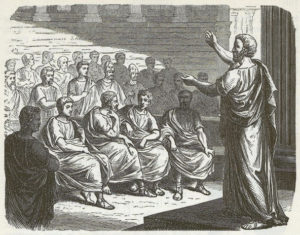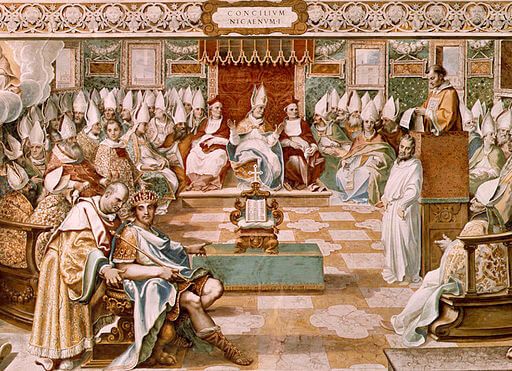“My inclination is to avoid all assemblies of bishops, because I have never seen any council come to a good end, nor turn out to be a solution of evils. On the contrary, it usually increases them”
Gregory of Nazianzus
“Unless I am convicted by Scripture and plain reason – I do not accept the authority of popes and councils, for they have contradicted each other – my conscience is captive to the Word of God. I cannot and will not recant anything, for to go against conscience is neither right nor safe. Here I stand, I cannot do otherwise. God help me. Amen”
Martin Luther
Modern society holds certain fundamental tenets sacrosanct; the right to vote, democracy, the right to own property, free speech, etc., in other words ‘the unalienable Rights of Life, Liberty, and the Pursuit of Happiness.’ There is another equally strong tenet that even one with only the vaguest feel for things spiritual has, the concept of the Trinity. Nearly everyone knows the Father, the Son, and the Spirit are One in Trinity. This is taken as true without question; it just is. Christians regularly recite a creed affirming this even though few realize how it came to be, or hard fought the battles were, or how many people were tortured or died in wars for that creed to exist today. It didn’t have to be that way.
Rome, the Eternal City, is not much dwelt on during the Dark Ages. It is assumed the classic age of the emperors went by the wayside as the Church emerged from the ash heap of history to encompass all of the Mediterranean to northern Scandinavian and from Russia to England. It’s a tedious and dull story. Hardly! The third thru the ninth centuries were anything but a smooth transition for the Church. Although Rome was not exactly a backwater, it had lost its glory to Constantinople, Antioch, and Alexandria. All that Rome had going for it was Peter was crucified there and, he is the rock upon which the church will be built. Matthew 16:18. Alexandria’s glory was the greatest library of the ancient world and the western center of theology. Antioch was considered one of the most beautiful of the ancient cities, boasting it had the greatest library, was also a major seat of learning and, the eastern center of theology. Constantinople was ancient when renamed in 330 and grew to be the largest and wealthiest city in Europe. Rome was left in the dust, actual dust.
In the third thru the ninth centuries Rome, Antioch, Alexandria, Constantinople and others like Carthage, Ephesus, and Chalcedon were holy sees, the seats of powerful bishops. Each claimed to be the center of the Christian world. Each held to this or that doctrine as absolute spiritual truth, and therefore, ought to be the rightful center of the Christian world. In hindsight it was unlikely the runt of the group, Rome, would come out on top. That, though, is not the whole of the story.
During this dark period western civilization was being harassed, needled, pillaged, burned, and taken over by the Vandals, Goths, Visigoths, Ostrogoths, and Huns, to name a few. As these frightful fellas came from the north and east deals needed to be made, tributes needed to be paid and, emperor’s sisters needed to be married off to the marauders to stem their unpleasantness. It did not take long for the whole of Europe to be ruled by warlords linked to civilizing women with children Christianized and educated in what was left of the great schools. That, though, is not the whole of the story.
Maintaining a bishopric as the seat of the Christian world did not come easy. A doctrine had to be developed and followed without question as right and true. This required muscle to keep the differently believed in line, and what a time it was for burly monks to bash heretical heads. Then there was the curiosity of the unwashed monks who believed in utter self-denial for the sake of continuously contemplating God. Hard to argue against that logic. That, though, is not the whole of the story.
Bishoprics were not the quaint and quiet monasteries of the sixteenth century. They existed at the behest of the warlords and emperors. Who was paying who was a jumble. It was prudent to pay a warlord to leave you alone, but it was conversely prudent of the warlord, or emperor, to pay for the privilege of going to heaven or even being crowned emperor by the pope as in the later years. Money made the world go round. Peasants revolted against the high taxes, plunder was taken, and powerful bishops skimmed of as much as they could along the way.
It is against this backdrop that Constantine first tried to make peace in the realm, peace with the first encroaching marauders, and peace with theologians who called for Christians to kill one another. He called together the first ecumenical council to settle doctrinal issues once and for all. In 325 a number of unifying housekeeping details were taken care of such as setting the date of Easter and putting an end to self-castration. The primary reason, though, for this council, and others, was to anathematize Arius for preaching Jesus was the Messiah born human to Mary. This council was to settle all matters for all time. Too bad it was more like The Great War settling all wars for all time.
So far there have been twenty-one ecumenical councils. There have also been many smaller synods. As an aside, the Synod of the Oak is a personal favorite. In the year 402 it involved forty-two archbishops, bishops, money, bribes, the highest of officials, the patriarch of Constantinople, betrayal, love of an empress, and fun gangs like the “Tall Brothers.” This was the flavor of the early councils. Let it be said they were not prayerful and thoughtful equivocations of theological fine points. In fact, the thrust of the first nine was to anathematize and often kill Christians of a different belief.
Back to the First Council of Nicaea. Beginning in 325 it was to settle spiritual differences so Constantine could get back to his Pax Romana. 318 bishops, their aids, advisers, and servants were living in Constantine’s lap of luxury. Even Constantine sat in without guards as this was to be a civil discourse. The question at hand revolved around how Jesus being a man could not possibly save all mankind, yet if He were God, then it was God that died on the cross and God could not possibly die, plus it would make Mary theotokos, mother of God and not christotokos, Christ’s mother.
Most bishops were moderates looking for some sort of compromise, but there were two firebrands who would not give an inch. Even though it made many bishops uneasy, Athanasius introduced the term homoousian, meaning Jesus was of the same substance as God. Some tried to meet in the middle with homoiousian, meaning of a similar nature. But, the die was cast; either you were with Arius or with Athanasius. As a precursor to the Synod of the Oak, Athanasius was bribing bishops and making backroom deals slowly bringing enough bishops into his camp for a majority vote. The Arians were threatened with excommunication (including the loss of perks) and eternal damnation. Most saw the light. Only Arius, one deacon, and two bishops refused to sign what became known as the Nicene Creed. Constantine didn’t much care about homoousios one way or the other, but he was pleased to have settled all matters spiritual and was able to exile Arius. That, though, was not the end of the story.
Darn it all Eusebius signed the creed but did not entirely renounce Arius. This was no big deal except that Eusebius was Constantine’s friend, a member of the court, a bishop, and a distant relative. Confusing Constantine even more was his sister, Flavia Julia, who was a great friend of Arius and a bit of an Arian herself. Flavia and Eusebius had Constantine’s ear to the point of eventually rigging a trial against Athanasius. Being hardheaded, Athanasius would not allow a softening of his homoousian position, Constantine got mad, Athanasius was exiled, and Arius was returned. Now it was Arianism that began to spread. On Constantine’s deathbed Eusebius baptized his friend. Constantine’s son was a diehard Arian who further spread the concept of Jesus as a man. In fact, many Goths were converted to Christianity through Arianism. Its interesting the Goths never integrated into the Roman world because of this. The homoousios/homoiousios schism eventually tore western civilization apart.
The First Council of Nicaea was rather mild compared to others. But, it was typical of how the government, the bishops, bribes, the fight for power, and out and out beating and murder set the stage for writing creeds. Make no mistake these were not spiritual get-togethers where prayerful meditations led the faithful to God’s intent. The 431 Council of Ephesus was nearly the same as Nicaea except with different names: Cyril (The Great) from Alexandria in the west and Nestorius from Antioch in the east – same faces, a different time. At Ephesus Mary became the Mother of God, Christ became one divine person, and Nestorius was anathematized. Anathematizing the Nestorian heresy was the whole point of this council. Pope Leo the Great called it the Robber’s Synod. During the Gangster Council a bishop was so badly beaten that he died a few days later. Basically Arius and Athanasius came back in different disguises for five hundred fifty more years.
325 First Council of Nicea
381 First Council of Constantinople
431 Council of Ephesus
451 Council of Chalcedon
553 Second Council of Constantinople
680 Third Council of Constantinople
757 Second Council of Nicaea
869 Fourth Council of Constantinople
After the Fourth Council of Constantinople the Eastern Greek church was split for evermore from the western Catholic church of Rome. This was formalized in 1054 as The Great Schism. From this point on churches would easily get their theological noses out of joint. Some recognized the thirteen Catholic councils that followed, and some recognized others. A fun term that really upset the theological apple cart is Filoque; meaning the procession of the Spirit from the Son as well as from the Father. Even this confusing term has its further nuances and extended nuances – veerrryyy difficult.
Arius and Athanasius rang through the Great Councils one way or another for five and a half centuries. Even today a Trinitarian creed is recited with the absolute belief it is the absolute truth. The truth is Christians are reciting the results of murder, bribery, hardheaded theology, and a struggle for temporal power. It makes no difference which creed one chooses, they were all the result of anathematizing someone or something. Here are a few:
Apostles’ Creed anathematized Marcion (120)
Nicene Creed anathematized Arius (325)
Nicaea-Constantinople Creed anathematized Nestorius (381)
Chalcedonian Creed anathematized the Monophysites (451)
Athanasian Creed re-anathematized Arius (500)
On top of these five are a hundred others developed by the myriad of Christian sects who may or may not add the Filoque.
IT DID NOT HAVE TO BE THIS WAY. Jesus did not ask anyone to write a creed explaining His relationship to the Father and the Spirit. He surely did not want murder and wars to be in His name. Jesus, the Great Teacher, would have taught us about the relationships of the Trinity if He wanted us to know? Some things are secret to God. These days professors teach endlessly on theological terms.
These days those in the pews earnestly recite their favorite creed. These days Christians jump to the defense of their favorite creed. And, these days Christians mindlessly defend the concept of the Trinity, even though most have no understanding of the dense and conflicting terms or understand how the Trinity came into existence. All this leads Christians to be at odds with Christians. It did not have to be this way!
Christians ought to drop the hubris and with humility believe in God the Father, Christ the Savior, and the Holy Spirit as a personal Paraclete. It’s just that simple; nothing less and certainly nothing more.
Copyright 2021 by Greg Hallback

 some as a clue that he wanted to sow peace and reconciliation in the Body of Christ. It turned out they were wrong. He still felt like arguing! Interestingly enough, the session he chose for sharing his heart was listed on the Reunion Program as “The Mark of the Lamb“. The theme was “By this shall all men know you are my disciples if you have love for each other.” The irony of what followed was exquisite.
some as a clue that he wanted to sow peace and reconciliation in the Body of Christ. It turned out they were wrong. He still felt like arguing! Interestingly enough, the session he chose for sharing his heart was listed on the Reunion Program as “The Mark of the Lamb“. The theme was “By this shall all men know you are my disciples if you have love for each other.” The irony of what followed was exquisite. remembered for your brazen desire to banish and excommunicate anyone who disagrees with you. Thank God the Kingdom is not yours!
remembered for your brazen desire to banish and excommunicate anyone who disagrees with you. Thank God the Kingdom is not yours!
